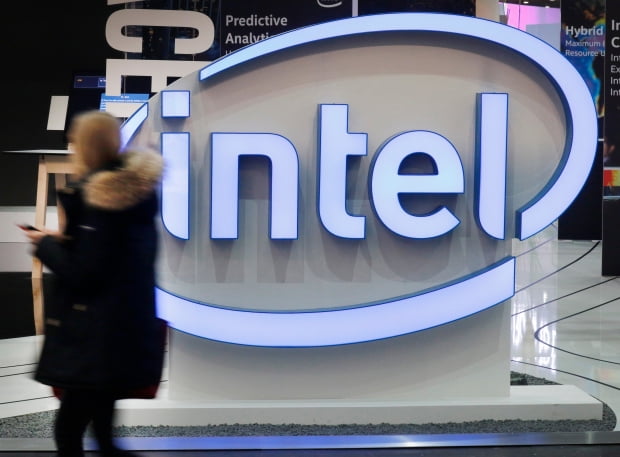
Photo = EPA
It is known that Samsung Electronics has won orders for outsourced semiconductor production from Intel. Intel, which has been pointed out that’semiconductor production technology is not as good as it used to be’, selected Samsung Electronics as a foundry company to entrust chip production. It is predicted that Samsung Electronics is also likely to win orders for the central processing unit (CPU), which is the core chip of Intel.
According to the related industry and information technology (IT) media SemiAccurate on the 21st, Intel recently entrusted Samsung Electronics to produce some semiconductor chips. Samsung Electronics plans to produce Intel chips from the second half of this year at a foundry plant in Austin, Texas. The production scale is 15,000 wafers per month, based on bringing in wafers.
The Austin plant has a 14nm (nanometer, 1nm = 1 billionth of a meter) line. Compared to the 5nm or 7nm process that manufactures the latest smartphone application processor (AP) and CPU, it is’old fashioned’. This is the reason why an analysis comes out that Intel would have entrusted the GPU with a small need to produce in the latest process.
Kim Sun-woo, a researcher at Meritz Securities, said, “The cooperation between Intel and Samsung Electronics is highly likely to begin with GPU production. If Samsung Electronics expands its Austin plant, it will be able to produce high-value products even in 5nm high-tech processes.”
It has not been confirmed whether TSMC from Taiwan has won orders for Intel. In the industry, it is predicted that Intel will distribute the volume to Samsung Electronics and TSMC rather than to drive the volume to a foundry.
A Samsung Electronics official said, “We cannot confirm customer related matters.”
Samsung, Intel outsourcing production contract… 14-nano product monthly scale of 15,000 sheets
The possibility of receiving additional CPU orders also increases… Intel seems to be focusing on flagship products
Samsung Electronics and Intel. The two semiconductor empires, which compete every year for the world’s No. 1 semiconductor sales position, are unexpectedly’closely related’. A clear example is that Raja Koduri, senior vice president of Intel, gave a keynote speech at the’SAFE Forum’ that Samsung Electronics held online in October last year. Intel is using the latest DRAM procurement from Samsung Electronics to improve the performance of its products such as graphics cards.

Intel chip mass production in the second half of this year
The foundry (semiconductor entrusted production) contract recently signed by Intel and Samsung Electronics is also evaluated as a result of’long millwall’. Intel is able to focus on R&D and production of its flagship central processing unit (CPU) by entrusting its graphics processing unit (GPU) to Samsung Electronics’ Austin plant in the US. Samsung Electronics was evaluated as’the technology is never behind TSMC in Taiwan’.
According to SemiAccurate, the semiconductor industry and information technology (IT) media, on the 21st, Intel entrusted the consignment production of GPUs to the Samsung Electronics foundry factory in Austin, Texas. It means that Intel asked Samsung Electronics to “produce and deliver GPUs at Samsung Electronics’ factory in the US.” Full-fledged production is likely to begin in the second half of this year.
The reason Intel entrusted Samsung Electronics to consignment production of the chip was due to criticism of’low manufacturing technology’. Intel is mass-producing the latest CPU in the process of 10 nm (1 nm = 1 billionth of a meter) line width (the width of the transistor gate through which electrons flow). On the other hand, foundry companies such as Samsung Electronics and TSMC produce chips by receiving orders from customers in ultra-fine processes with a line width of 7 nm and 5 nm. AMD, which competes with Intel in the CPU market, is TSMC’s main customer for 7nm process. For this reason, from the beginning of last year, the evaluation that “AMD CPU from 7nm process is better than Intel’s 10nm product” was dominant. At the end of last year, a hedge fund that owned a 0.5% stake in Intel publicly criticized Intel’s technology.
Leave it to 14nm first and’test your skills’
As this situation continued, there was a story inside Intel that’some semiconductor production can be left to a foundry.’ Recently, US media reported that “Intel can use external foundries starting with the non- flagship GPU.”
The Samsung Austin plant is equipped with optimal conditions for producing GPUs. The main production line is the 14nm process. The 14nm process is evaluated as older than 7nm and 5nm, which make the latest semiconductors with ultra-small, low power, and high performance, but it can produce various products such as GPUs.
It is also evaluated as suitable for Intel’s strategy to entrust the production of non-core products to foundries. Companies where GPU is the key, like Nvidia, need the latest processes such as Samsung Electronics’ 8nm line. However, as Intel, which is the first to outsource production to Samsung Electronics, using the Austin plant, which is relatively inexpensive, is evaluated as a’not bad choice’.
Foothold for additional orders in 2023
In the semiconductor industry, based on this order, it is evaluated that Samsung Electronics has laid a foothold to win future Intel’s flagship CPU volume. Intel plans to entrust some of the CPUs to foundries from the second half of 2023. It is predicted that if Samsung Electronics expands its Austin plant and operates ultra-fine processes of 5 nm or less, it can bring a contract for CPU production.
Some analysts say that Intel would have entrusted the outsourcing production to Taiwan’s TSMC together with Samsung Electronics. Bloomberg recently reported that “TSMC is preparing a 4nm line to produce Intel supplies.” In the market as well, the observation that Intel will use a’multi-vendor’ strategy to diversify the risk (risk) is predominant.
Reporter Hwang Jeong-soo [email protected]
